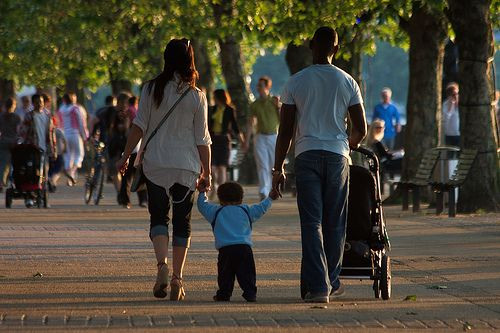Putting Your Child Before Yourself Leads To Better Mental Health: 'Child-Centric' Parents Are Happier, More Fulfilled

In the media, television moms like Debra Barone from Everybody Loves Raymond and Claire Dunphy from Modern Family have been portrayed negatively as “helicopter parents” or “tiger moms” who have a “child-centric” approach to parenting — putting their children before themselves. These parents are typecast as maximizing their child’s well-being even if it comes at the cost of sacrificing individual pleasures and pursuits. A recent study has shattered the negative stereotypes of child-centric parenting and has found that parents who put their children before themselves are happier and have a better sense of life fulfillment.
Publishing in the journal Social Psychology and Personality Science, researchers examined how placing one’s children at the center of family life affected parental well-being using a sample size of 322 parents in two studies.
In the first study, 136 parents with at least one child, 18 or younger and living at home, were asked to complete a child-centrism scale to measure their parenting style. Upon completion of the scale, the participants were then given a survey to measure the happiness and meaning in life they experienced from having children by responding to statements such as "My children make my life meaningful," Medical Xpress reports.
Contrary to popular belief, the researchers found that parents who put their children before themselves were significantly more likely to report higher levels of happiness and a greater sense of purpose from having children.
In the second study, 186 parents with at least one child, 18 years or younger and living at home, were asked to retell their previous day’s activities and record how they felt during each activity. The participants had to report at least one child care episode and one non-child care episode in yesterday’s activities. Child-centric parents reported higher levels of positive emotions when taking care of their children compared to doing non-child care activities.
The results of these two studies indicate that child-centric parents had greater positive feelings, less negative feelings, and experienced more life fulfillment when participating in child-care episodes.
"These findings suggest that the more care and attention people give to others, the more happiness and meaning they experience," the authors wrote.
Claire E. Ashton-James, lead researcher of the study, notes that there is little research to support the stereotype that investing time in one’s child comes with a personal cost. Rather, investing financial and emotional resources in others, like children, can lead to greater happiness and fulfillment than investing in one’s self. “In short, when it comes to parental well-being, you reap what you sow,” she said in the report.
In a similar study, findings showed that parenthood comes with more positive experiences than negative ones. The researchers tested whether parents were happier overall than their childless peers, and whether parents experienced more positive feelings when taking care of children than during their other daily activities. Greater levels of parental happiness, positive feelings, and life fulfillment were consistent in parents than non-parents.



























